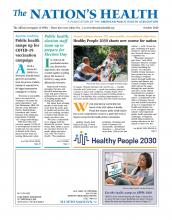People struggling to feed themselves and their families are at high risk for heart disease, according to a recent study.
Published in August in Health Promotion Practice, the study found associations between food insecurity and deaths from heart disease. The general mortality rate for food-insecure people was 46% higher than for people with a sufficient diet, while the death rate from cardiovascular disease for food-insecure people was 75% higher.
“Public health practitioners should consider food insecurity and diet quality along with other social determinants of health when determining an individual’s overall health risk and especially the risk for cardiovascular disease,” the study authors said.
Over 14 million households in the U.S. were food insecure in 2018, meaning they did not have enough food to meet the needs of family members on a regular basis. While many previous studies have examined the affects of food insecurity on a person’s health, the new study is the first to examine the long-term health effects.
“Most people who look at food insecurity look at one point of time,” Jagdish Khubchandani, MPH, MBBS, PhD, coauthor of the study, told The Nation’s Health. “We wanted to find a stable pool of people and follow them over a long period of time.”
The researchers analyzed data from the National Health and Nutrition Examination Survey, a yearly assessment conducted by the Centers for Disease Control and Prevention that aims to evaluate the health and nutritional status of people in the U.S. The team used data from six survey cycles collected between 1999 and 2010, yielding a total study sample size of 25,000 people. Even after adjusting for factors such as race, age, gender and health risks, the team found clear connections between food insecurity and increased mortality.
“It could be that food insecure people have so much stress that maybe they have cancer, strokes or heart disease and they end up dying sooner,” Khubchandani said.
The study found that food-insecure people were more likely to have low incomes, smoke tobacco and have a chronic health condition such as obesity or diabetes compared to food-secure counterparts. There were more also likely to be younger, minorities and have less education.
Khubchandani emphasized the importance of viewing food insecurity as a risk factor for cardiovascular disease, just as smoking and high cholesterol are considered risk factors for the condition.
“Screening for traditional risk factors is not enough, because we’ve been screening for those for ages now, and we know that heart disease is still the number one cause of death,” he said. “Why not add some food metrics to assess people’s quality of life? Are they getting enough food? Is it nutritious enough? That has direct implications on heart health.”
For more information on the study, visit https://bit.ly/2EKn6cr.
- Copyright The Nation’s Health, American Public Health Association









